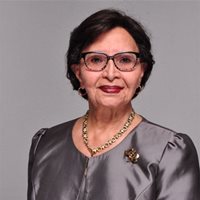
Sophia Theresa Williams-De Bruyn was born in 1938, in Villageboard, Port Elizabeth from working class parents, and attended Saint Patrick Catholic School in North End. During her higher primary education, due to economic pressures on her family, Sophia started working at Van Lane Textile factory during school holidays. It was here that her obvious leadership potential first started to emerge into the public domain. She was singled out by workers to speak on their behalf in addressing issues of ruthless discrimination and unjust working conditions imposed by factory bosses at the time. She later became a shop steward, and continued working in the factory. She never returned to school and gradually rose through the ranks of the union movement to become an executive member of the Textile Workers Union in PE during the post-year wars.
The 1950s were the beginnings of a tidal wave of popular opposition to the apartheid system which was then being imposed on South Africa after the Nationalist Party had come to power in 1948. The regime began a process of removing millions of people from their ancestral land, forcing them into racially-defined areas, creating separate educational and social facilities on a scale unprecedented in human history. Sophia found this totally unacceptable and took a stand against injustice.
During this dramatic period of apartheid imposition and popular revolt, she became the founder member of the South African Congress of Trade Unions (SACTU) - the predecessor to the modern day progressive trade union movement. Shortly afterwards, the Coloured People’s Congress was formed and in 1955 she was appointed as its full-time organiser in Johannesburg. When the Coloured Population Act was put forward, Sophia fought tirelessly around women and pass issues. She was at the forefront of the Congress of the People which had its historic convention in Kliptown in 1995 that adopted the Freedom Charter: the loadstar of democratic claims made to the apartheid regime. In 1956, Sophie – with Helen Joseph, Lilian Ngoyi and Amina Cachalia - led the famous Women’s March to the Union Buildings – and her face was immortalized in pictures taken of the women leaders who handed in their petition to the apartheid Government. She is the only surviving leader of this historical event.
With a massive clampdown on the democratic movement in 1960, she was forced to leave her country of birth into exile. She immediately joined the liberation movement in exile, and settled in Zambia. She rose to secretary of the ANC Women’s League in Lusaka, served on the Women’s Section Secretariat and, at the same time, carried out very “special” administrative duties for the late President OR Tambo at ANC headquarters. It was also in exile that she completed her “O” and “A” levels and later went on to study for a Teachers’ Education Certificate, which she completed in Nairobi, Kenya, in 1977. From 1980 she continued to carry out administrative duties for the ANC in Lusaka before returning to South Africa in 1993 when she was appointed by the organisation to head up its Human Resources Department at Shell House.
Her contribution to gender equality was recognised in 2001 when she was appointed a Commissioner for Gender Equality. In 2004, Sophia was elected to the Gauteng Legislature as an MPL and appointed Chairperson of the Gender Portfolio Standing Committee. In 2005, she was appointed to the post of Deputy Speaker of the Gauteng Legislature and held this post until 2009. She currently serves on several committees and councils and is about to be deployed to Parliament as an MP. She has won innumerable awards for her work over the years.
Sophie Williams-De Bruyn’s life represents an extraordinary journey of courage, moral conviction and sacrifice in the pursuit of a democratic, fair and equal South Africa. Her amazing personal journey personifies all the core values espoused by our university – social justice, democracy, respect for diversity and Ubuntu. For her exceptional contribution to the working people and greater humanity, and her pursuance of gender equality, Nelson Mandela Metropolitan University is honoured to present Sophia Williams-De Bruyn with the Council Prestige Award.